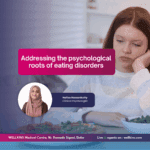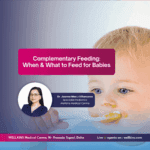Author: Dr. Joanne Mae J Villanueva (Specialist Pediatrics – Wellkins Medical Centre)
Childhood obesity is a complex health challenge worldwide, and addressing it requires sensitivity, education, and, most importantly, a positive family approach. It’s not simply about food; it involves genetics, environment, stress, and sleep. As a dedicated partner in family health, Wellkins Medical Centre understands the importance of navigating this topic carefully to foster confidence and build healthy habits, avoiding shame or anxiety. Our aim is to support children to make choices that support their best health. Here is an inclusive guide on how parents can effectively talk to their children about health, promote active play, and build a lasting foundation for physical and emotional well-being.
Shifting the Focus: From “Weight” to “Wellness”
The most important and immediate step parents must take is to remove negative emotional baggage from the conversation. Focusing strictly on weight or using terms like “diet” can damage a child’s self-esteem and lead to unhealthy eating behaviors later in life. Instead, shift the dialogue entirely to concepts of health, strength, energy, and overall well-being.

“Parents need the knowledge to establish proactive nutrition and physical activity habits right from infancy. It emphasizes that healthy weight isn’t just about appearance; it affects cardiovascular health, joint development, quality of sleep, and self-esteem. Consistent habits, coupled with regular pediatric check-ups, are the best investment in a child’s long-term systemic health and a confident, active future.”
Key Communication Principles:
Focus on Function and Feeling: Talk about what a healthy body can do and how it feels. Example: “Eating balanced meals gives you the endurance to play longer,” or “When we are active, we sleep better and feel happier.”
Avoid Blame and Criticism: Never criticize your child’s body shape or specific eating habits. Frame changes as a family effort, emphasizing that everyone in the household is making positive choices for better energy and long-term health.
Be a Role Model (Consistency is Key): Children learn most effectively by imitation. Your visible commitment to prioritizing balanced eating, managing stress, and being physically active speaks volumes more than any lecture or rule. Incorporate movement into your shared family time, showing it’s a priority for adults too.
Keep it Simple and Positive: Use age-appropriate, encouraging language. For younger children (under 8), focus on growth, fuel, and fun. For teens, discuss energy levels, mood stability, and optimal performance in academics or sports.
The Power of Active Play: Making Movement Fun
Physical activity should always be viewed as an enjoyable, intrinsic part of life, not a chore, a punishment, or merely a means to “burn calories.” Active play is essential not only for managing a healthy weight but for improving bone density, boosting mood (releasing endorphins), reducing anxiety, and enhancing cognitive function (focus and attention span).
Strategies for Encouraging Movement:
Schedule Family Activity Time: Treat physical activity like any other important appointment. Dedicate regular time for shared movement this could be an evening walk after dinner, cycling on the Corniche, hiking, or playing games at a local park. When movement is shared, it strengthens family bonds and establishes a lasting routine.
Prioritize Play Over Screens: Establish clear, reasonable screen time limits and always offer a physical alternative. Make the transition seamless by suggesting a fun game or outdoor activity right when screen time ends. Encourage activities that require gross motor skills and imagination.
Find Joy in Individual Sports: Encourage your child to try different activities swimming, martial arts (which builds discipline and coordination), dancing, or team sports. The goal is to find an activity they genuinely love and feel competent at, ensuring they stick with it long-term.
Walk the Talk (Literally): Integrate movement into everyday logistics. Whenever possible, choose walking over driving for short distances. Always take the stairs instead of the elevator. Even small bursts of movement throughout the day can significantly contribute to overall activity levels.

Making Food a Positive Discussion
Discussions about food should center on nutrition, variety, taste, and fueling the body for optimal performance, not restriction, guilt, or deprivation. The goal is to foster a healthy, intuitive relationship with food that lasts a lifetime.
Healthy Food Messaging and Strategies:
Educate with Color and Function: Teach your children about the function of food using simple, positive concepts. Discuss “Go Foods” (for energy), “Grow Foods” (to build muscle and bones), and “Glow Foods” (fruits and vegetables packed with vitamins for skin and immunity).
Involve Them in the Process: Take your kids grocery shopping and support them by letting them choose a new fruit or vegetable to try each week. Involving them in meal preparation washing vegetables, stirring, or setting the table makes them more invested and likely to eat what they helped create.
Foster Intuitive Eating: Help them recognize natural satiety cues. Teach them to listen to their body to stop eating when they feel comfortably full, rather than demanding they “clean their plate,” which overrides internal regulation signals.
Minimize Liquid Calories: Liquid calories especially sodas, sports drinks, and fruit juices high in added sugar are a major contributor to weight gain and provide little nutritional value. Establish water and low-fat milk as the primary beverages. Offering whole fruit instead of juice is always preferable.
Addressing Underlying Issues: When to Seek Professional Support
Childhood weight gain can sometimes be linked to complex factors beyond simple calorie intake and expenditure. These may include poor sleep quality, chronic stress (which elevates cortisol), or underlying hormonal or metabolic issues. At Wellkins Medical Centre, we approach this topic with complete confidentiality, compassion, and care:

Complete Assessment: We conduct gentle, thorough health check-ups that include monitoring growth charts, assessing blood pressure, checking cholesterol levels, and running relevant blood tests to rule out medical or hormonal causes (such as thyroid issues).
Personalized, Family-Centric Plans: We work with the entire family unit to create sustainable, non judgmental plans focused on nutrition and manageable lifestyle changes, actively avoiding quick-fix, restrictive “diets.”
Emotional and Psychological Support: We recognize the potential for social challenges, bullying, or low self-esteem associated with weight issues. Our holistic approach ensures children and parents receive the emotional support and behavioral strategies needed for a positive and lasting health journey.
Talking about weight with a child requires sensitivity and courage, but it is an essential conversation for their long-term health and emotional well being. By focusing on kindness, consistency, and making activity and nutrition a source of family joy, you can successfully guide your child toward a healthier, more confident future. We are here to support your family every step of the way. If you have any concerns about your child’s nutrition, growth, metabolism, or activity levels, feel free to ask and we are ready to provide expert advice.
To book an appointment at Wellkins Medical Centre: https://wellkins.com/visit






